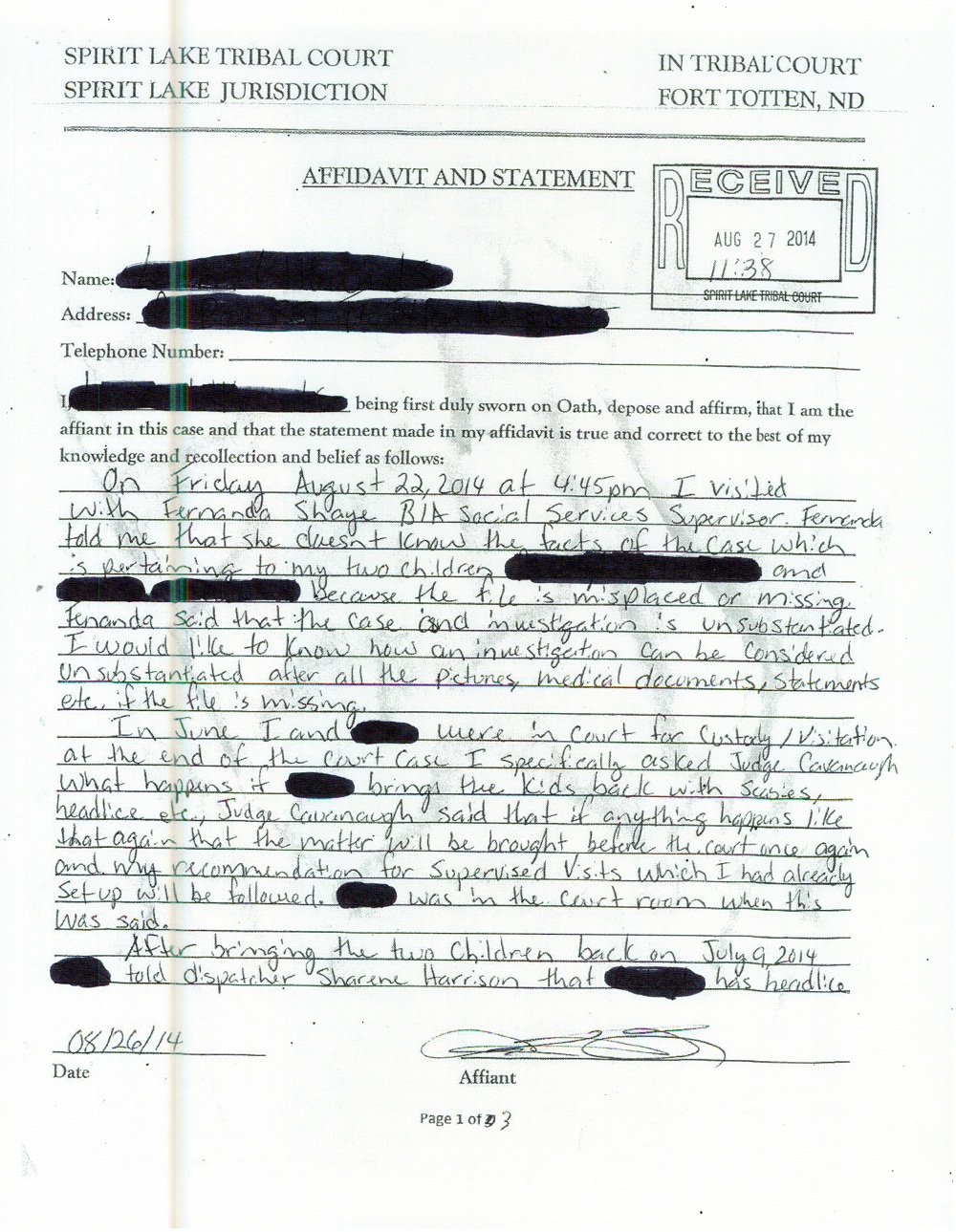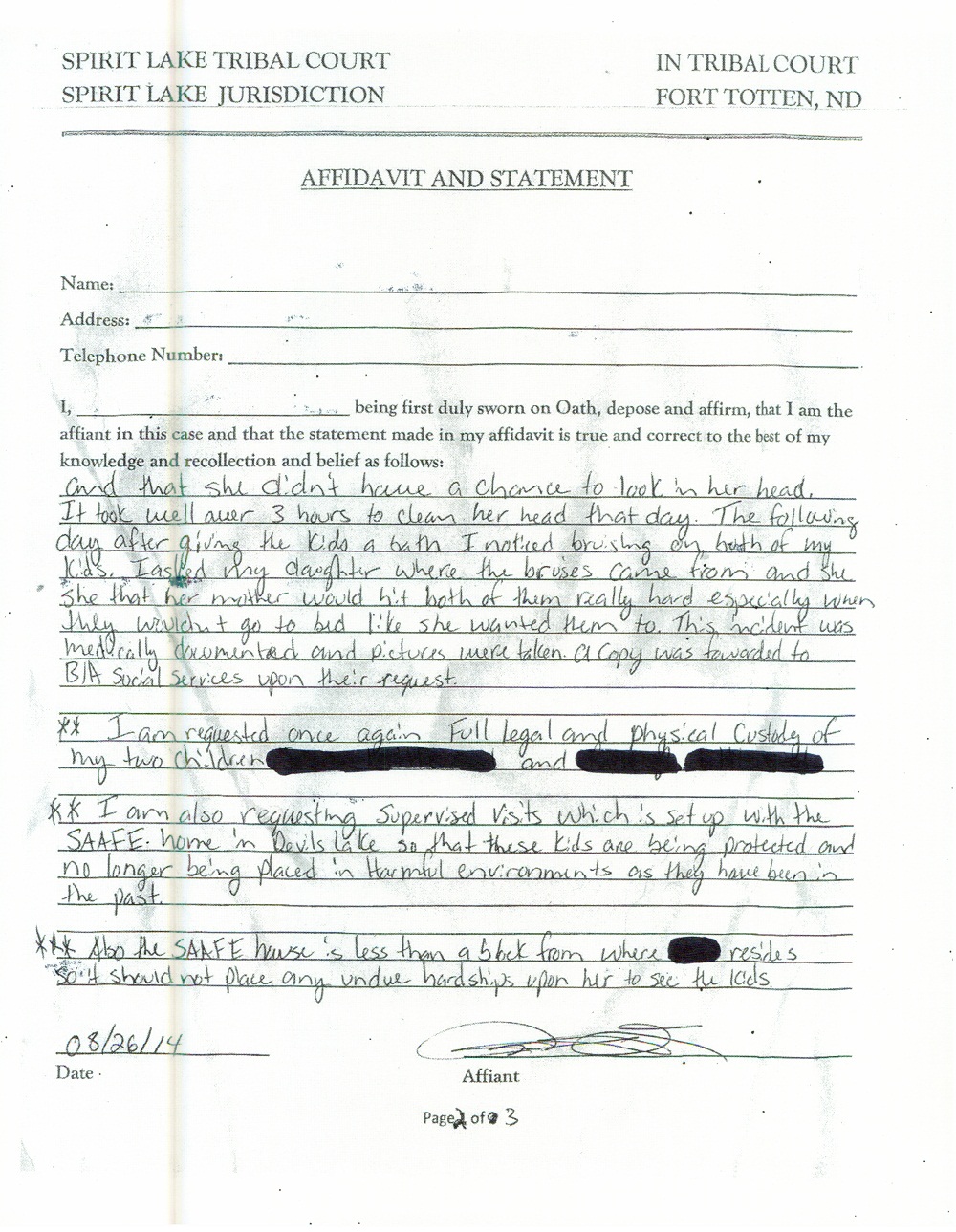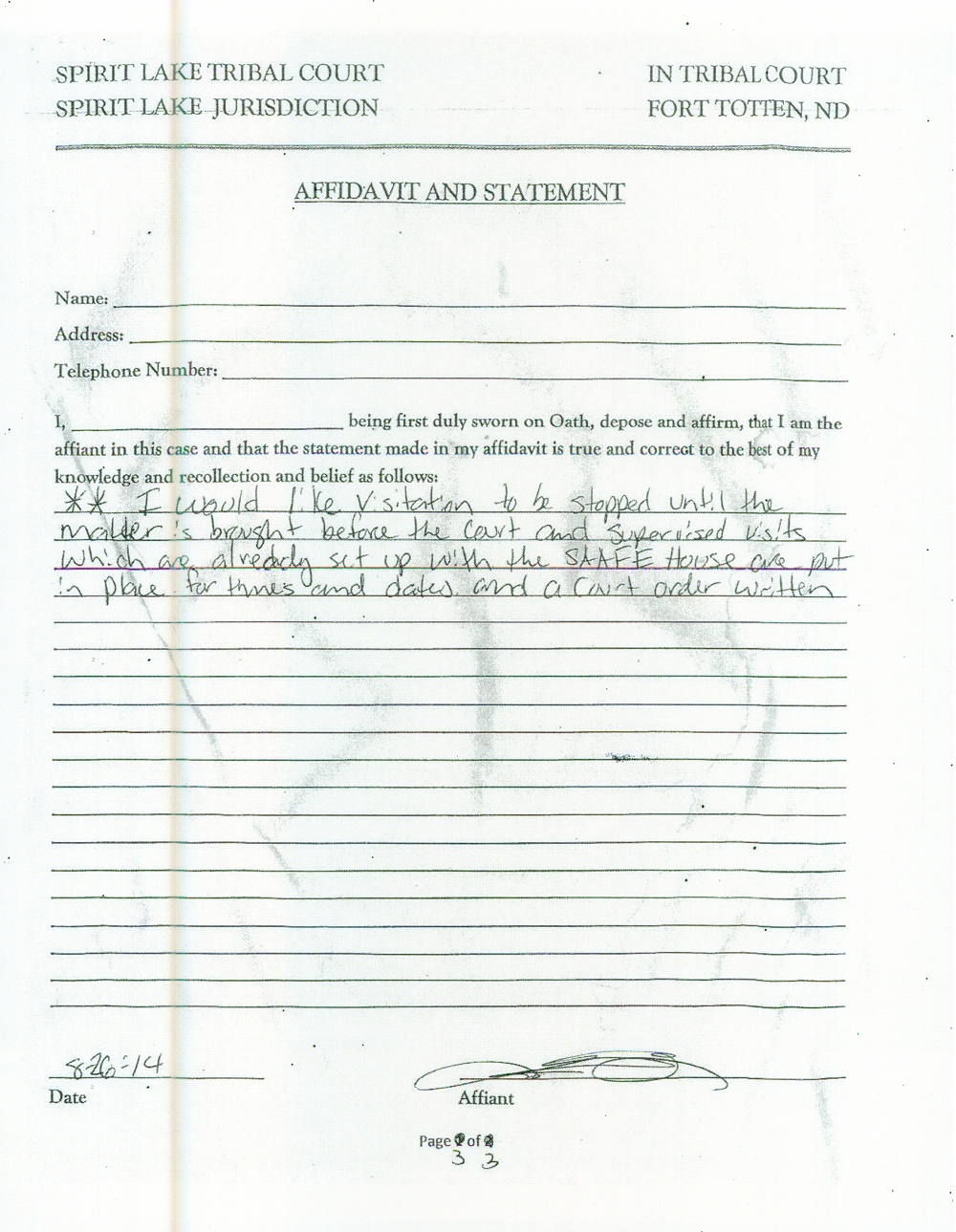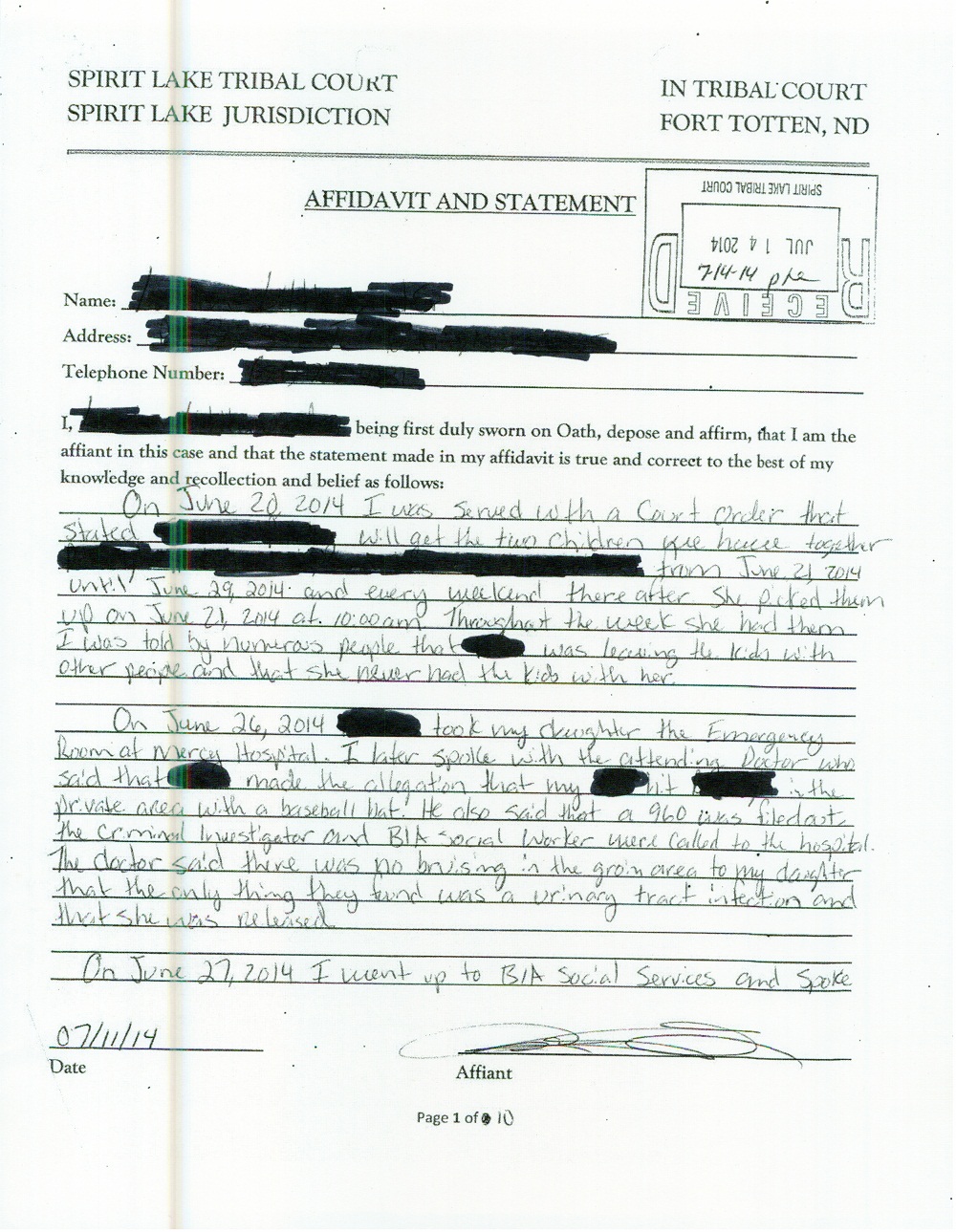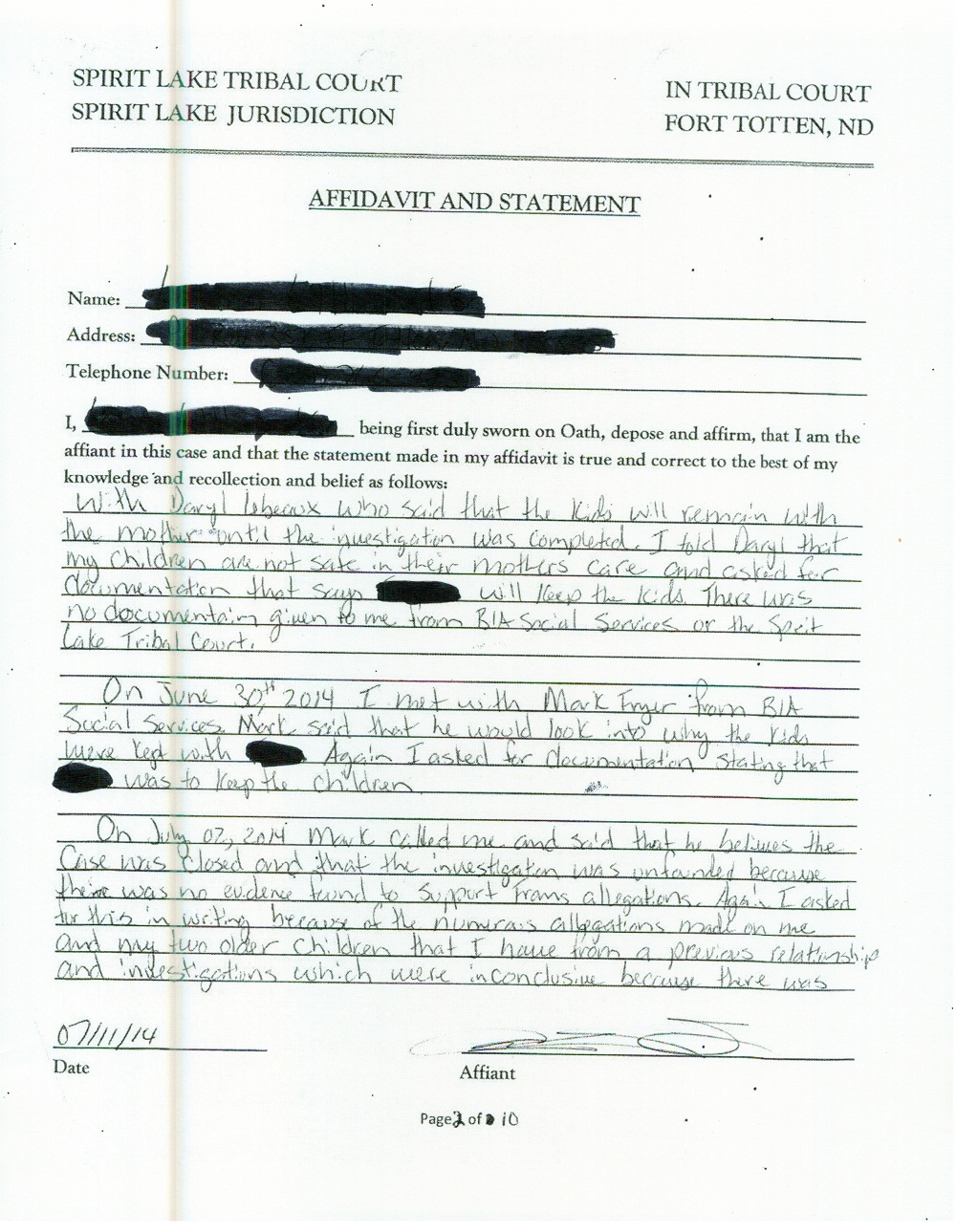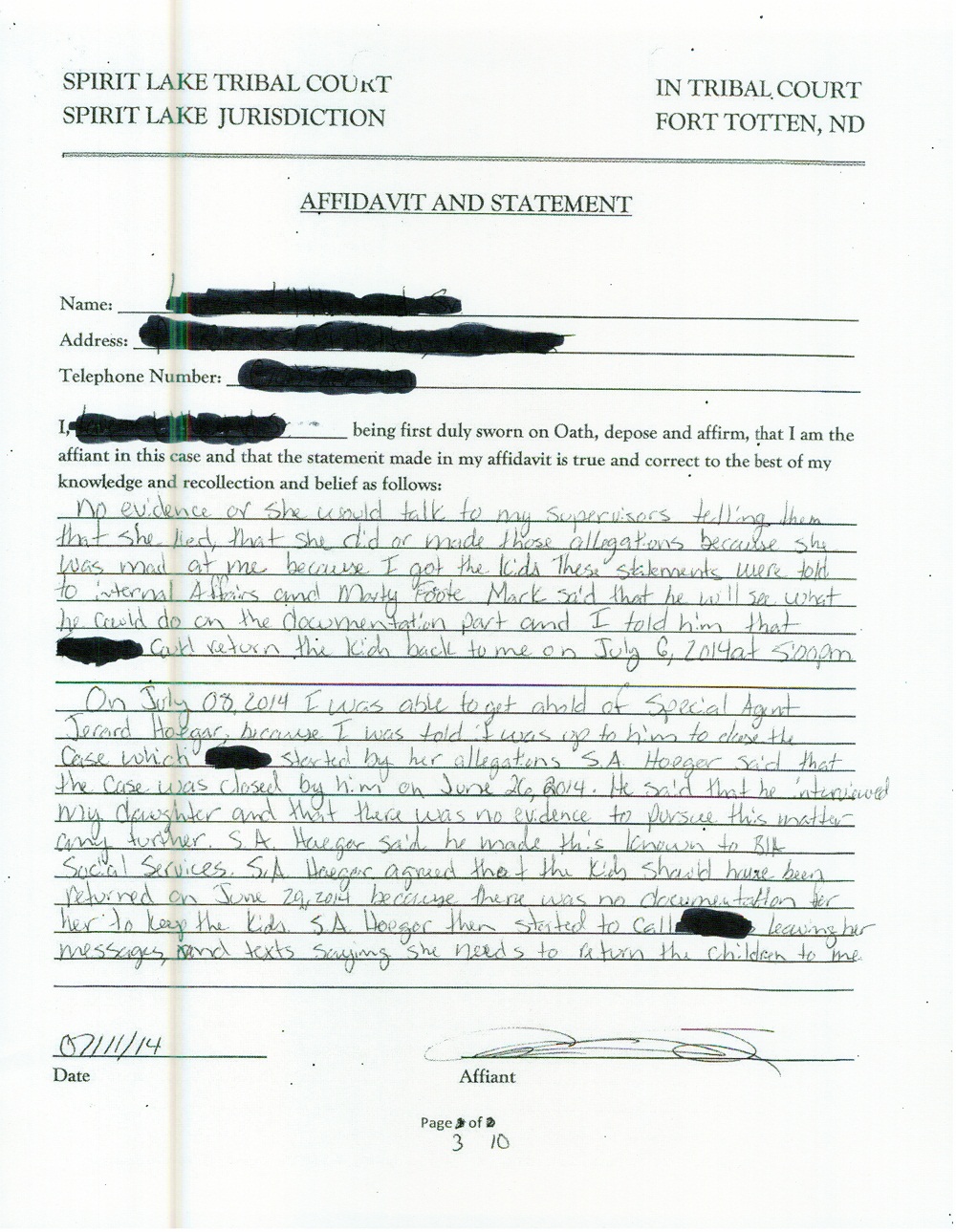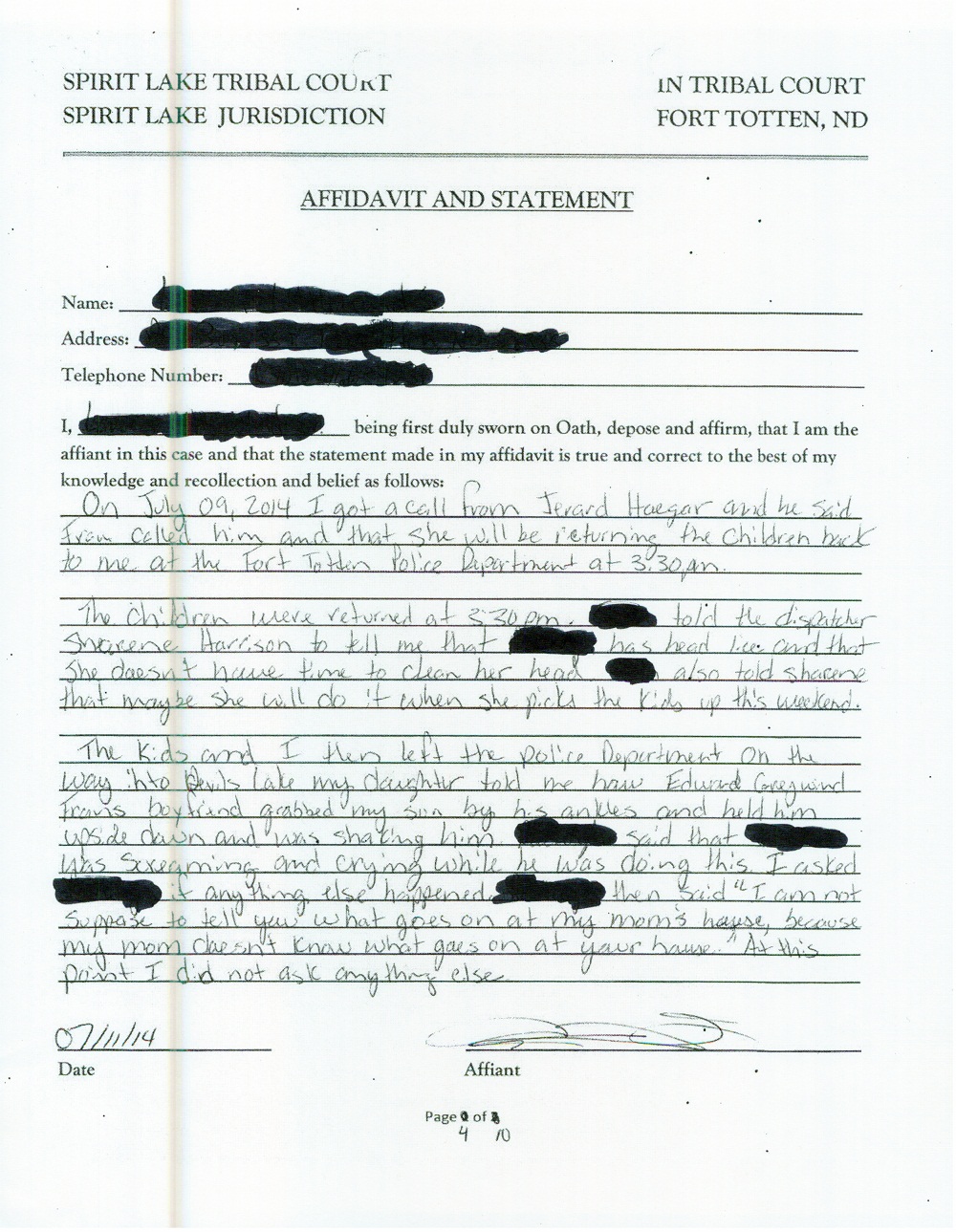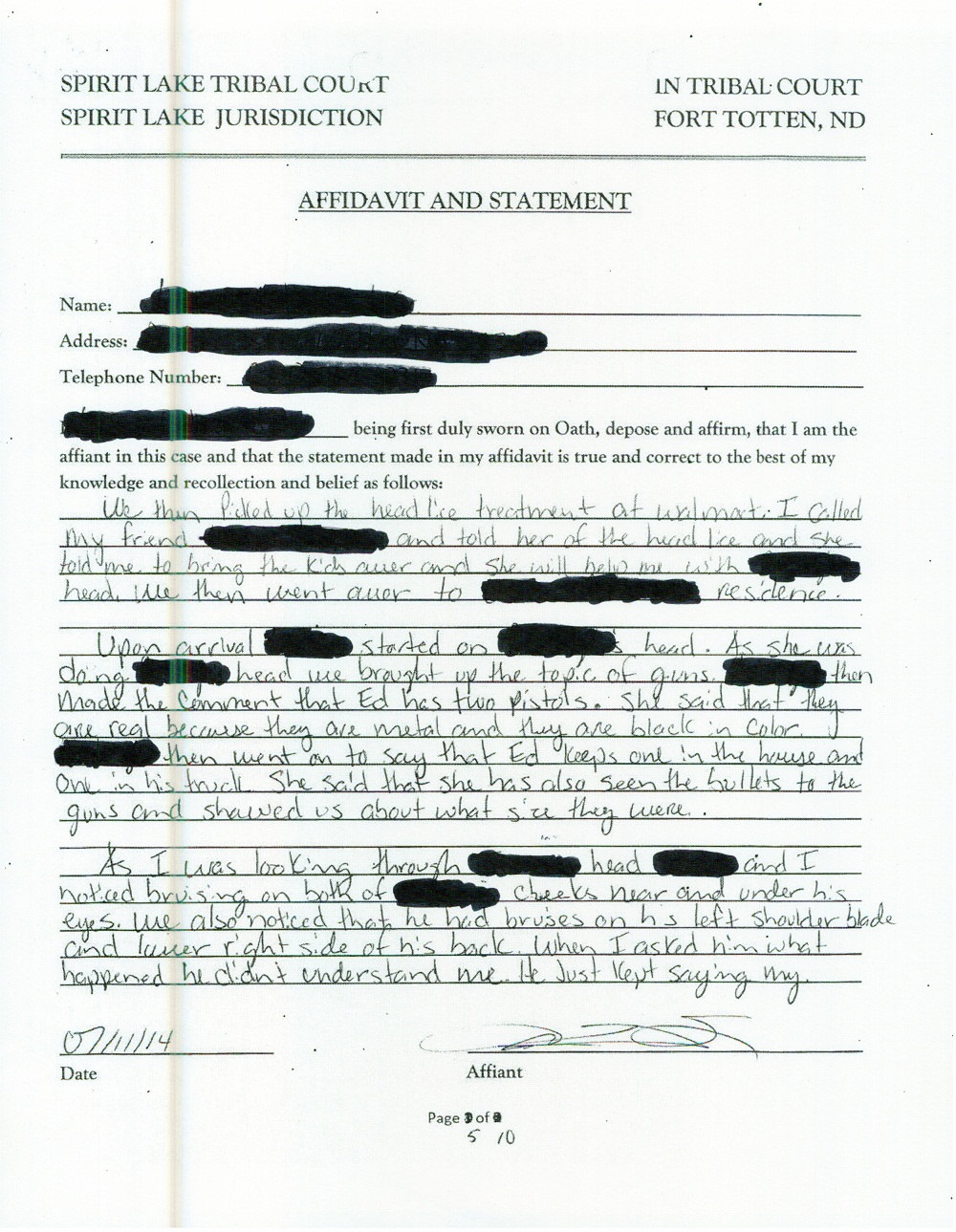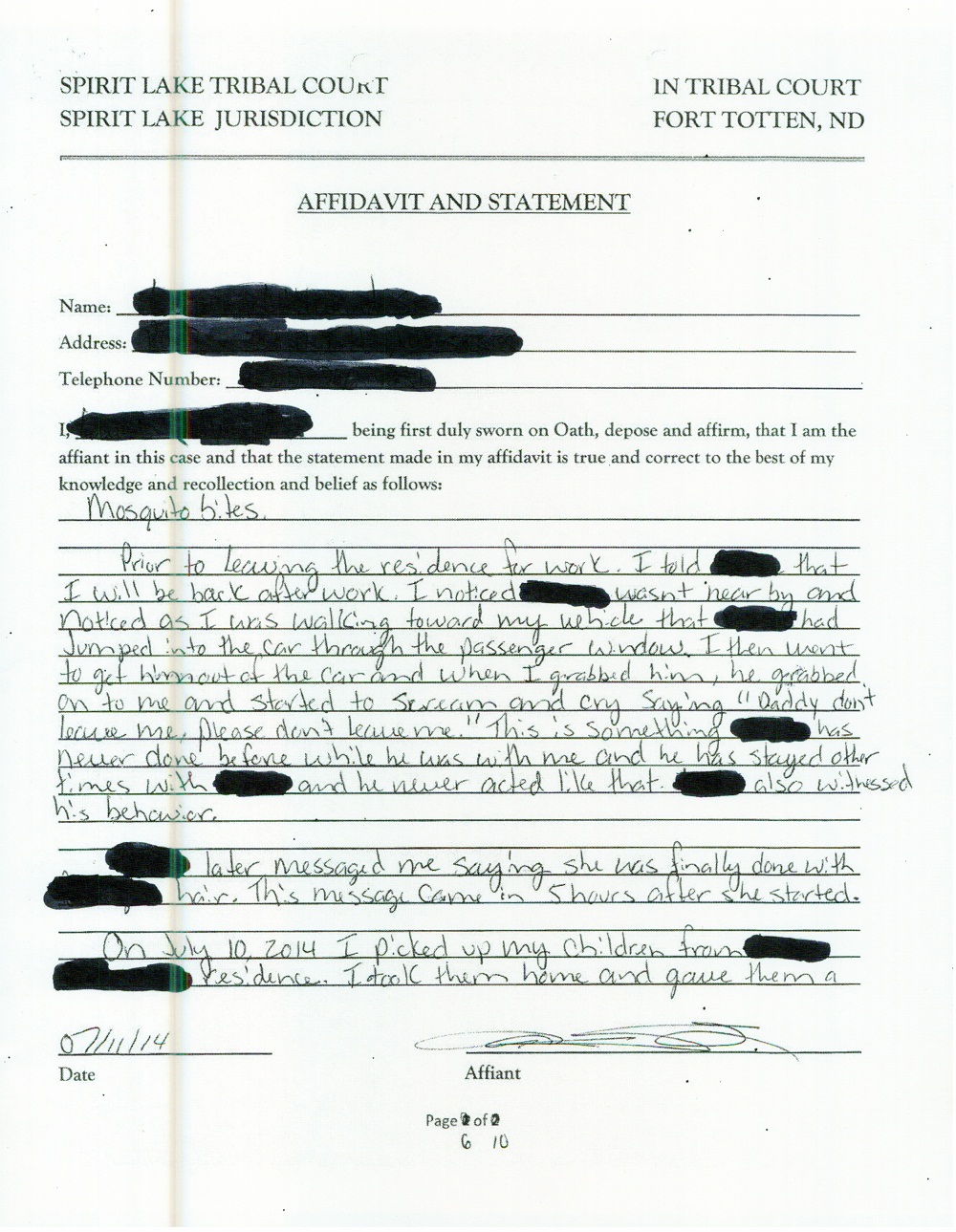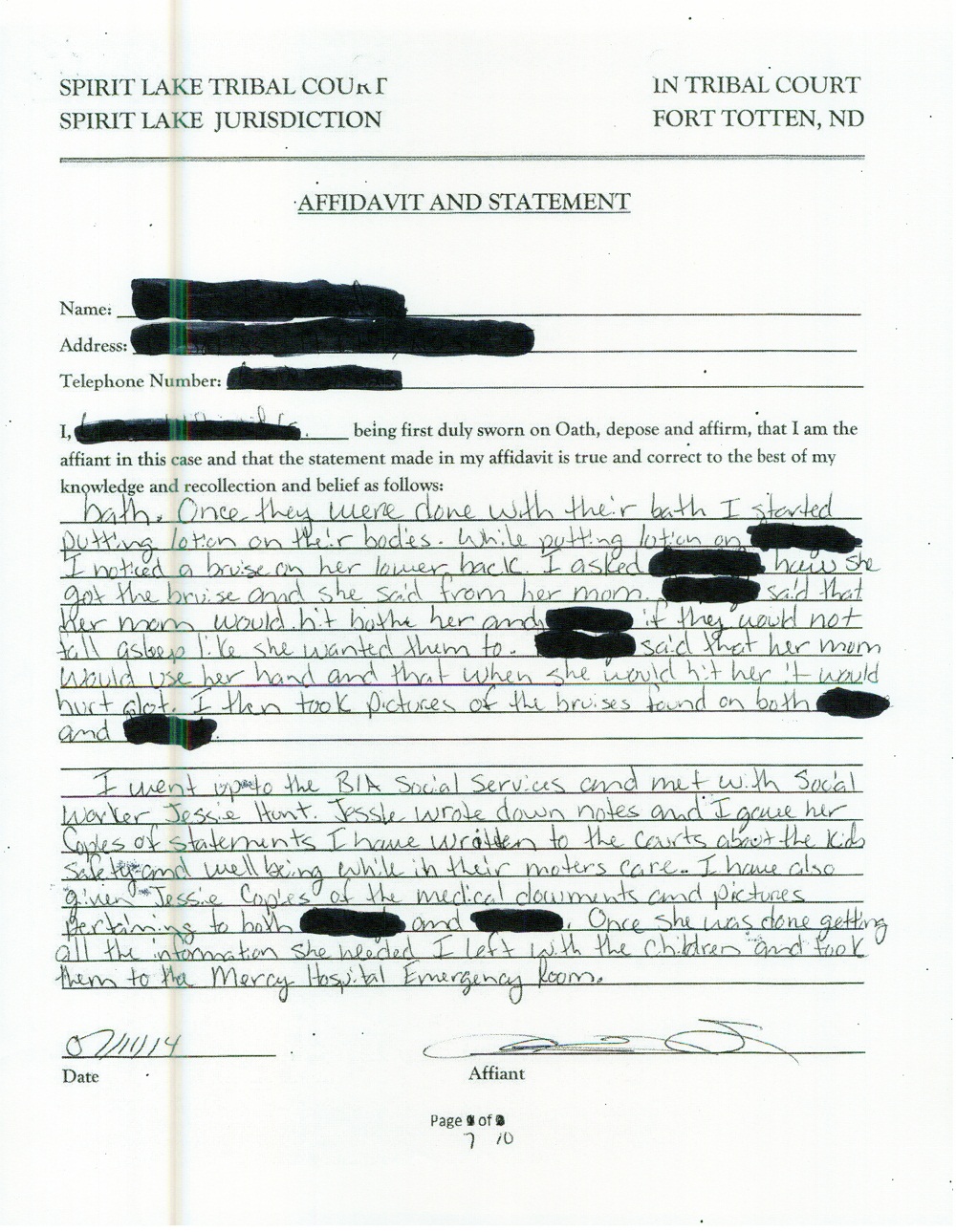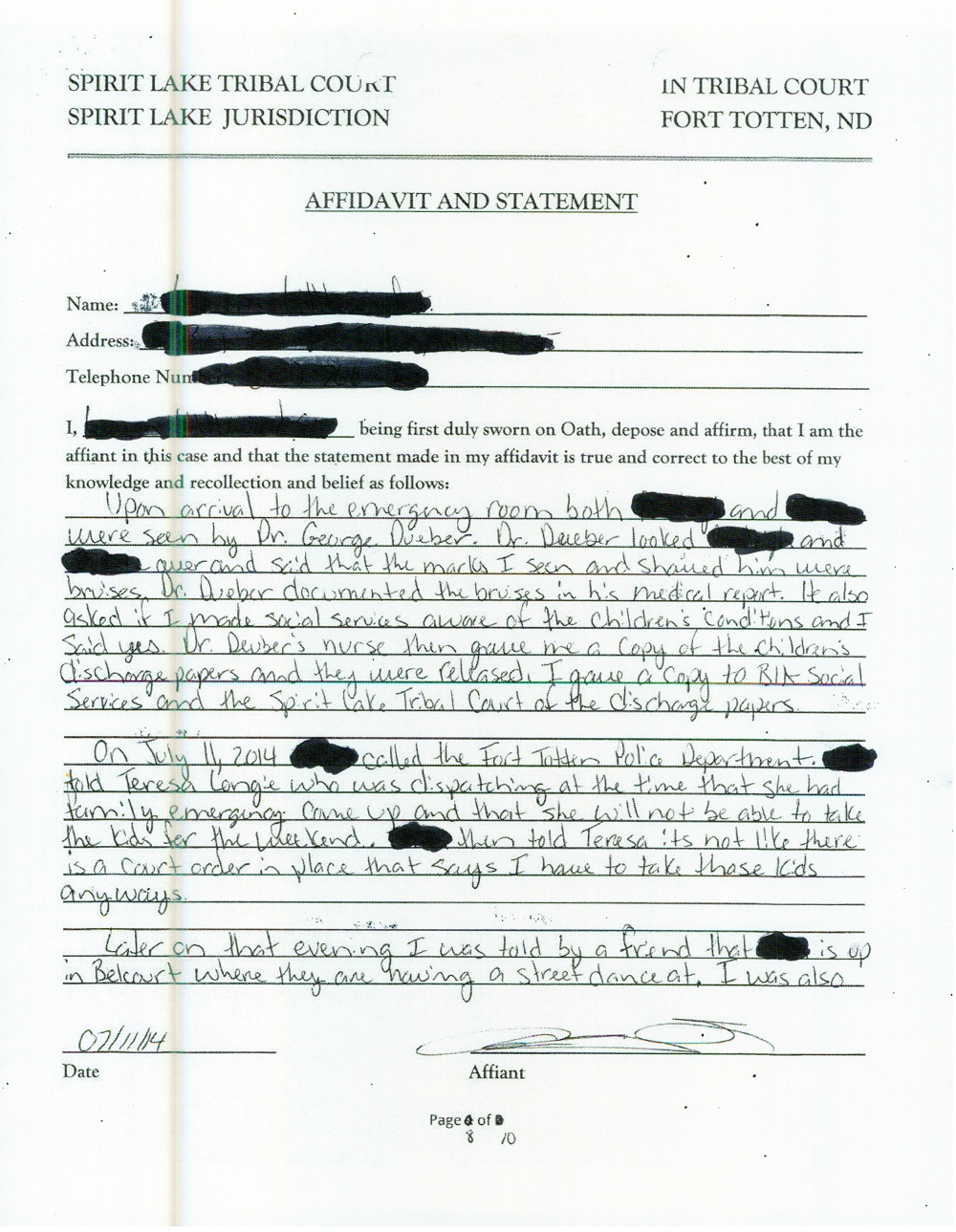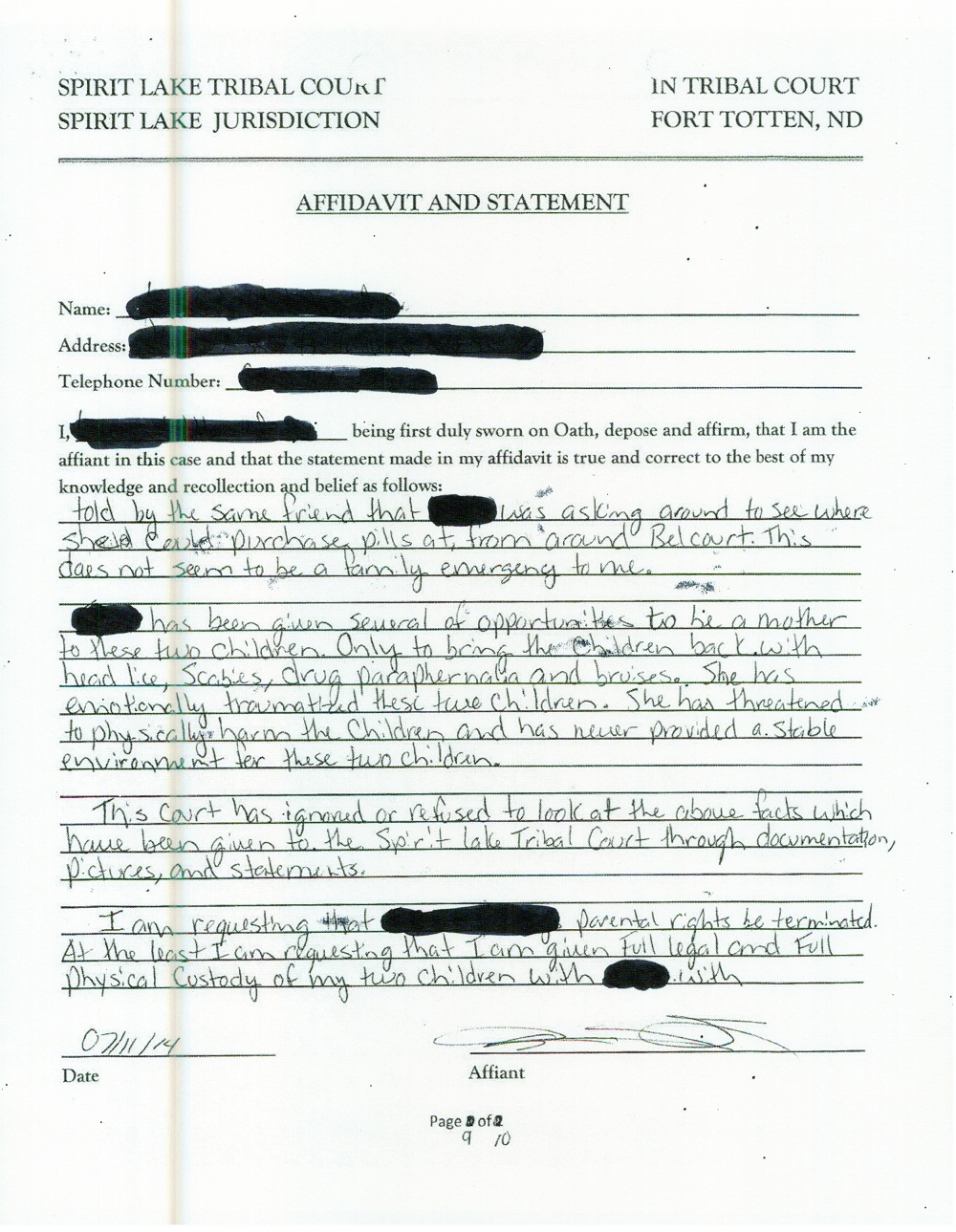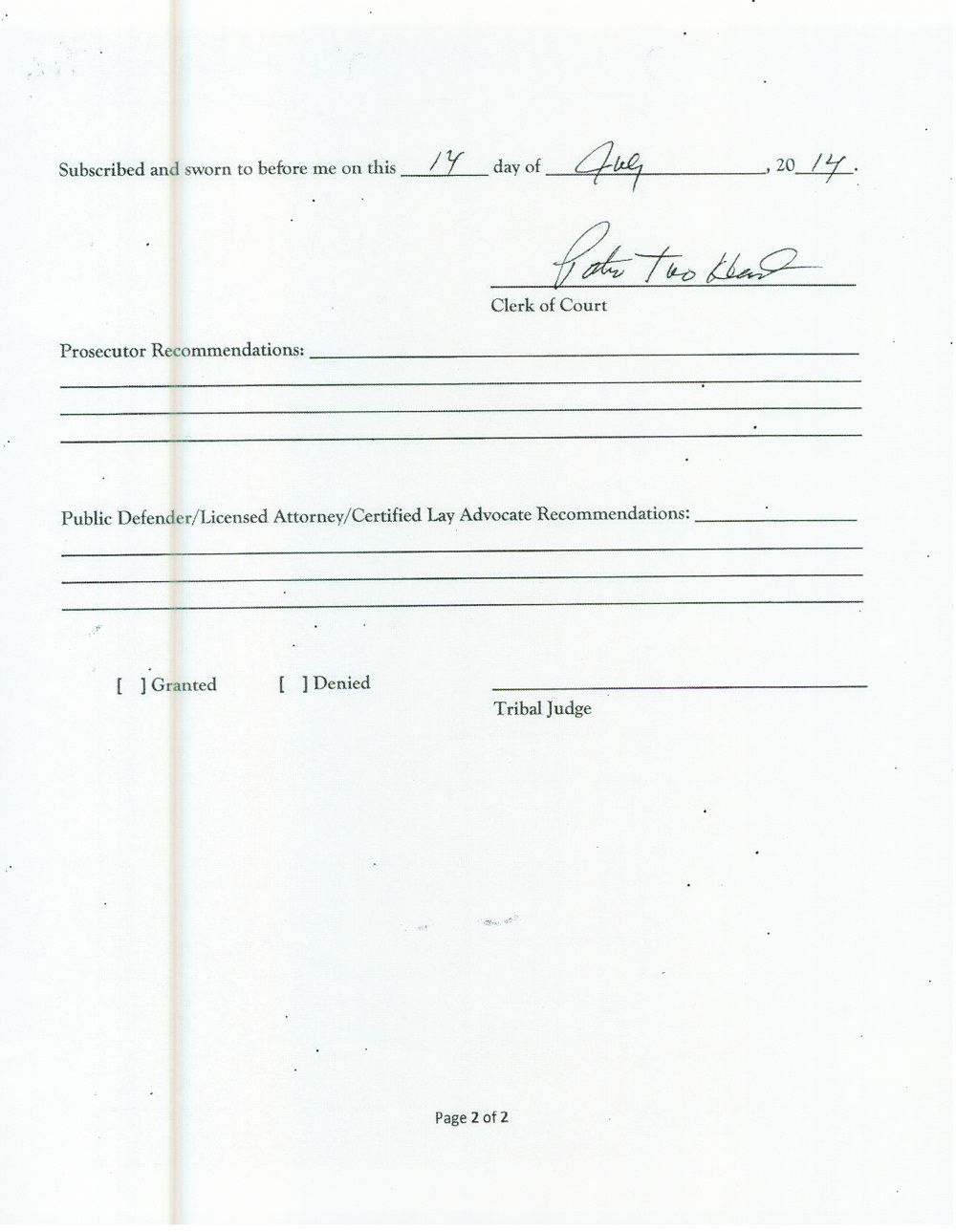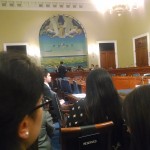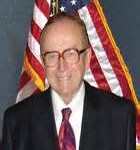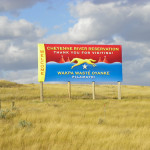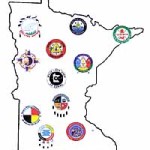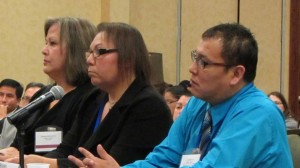Chairman Don Young, Congressman Kevin Cramer, and other distinguished committee members, I want to thank you for this opportunity to address child protection and the justice system on the Spirit Lake Reservation.
My name is Elizabeth Sharon Morris. I am the widow of Roland John Morris, a U.S. citizen of 100% Minnesota Chippewa heritage who was born and raised on the Leech Lake Reservation, speaking only Ojibwe until he started kindergarten. I am the birth mother, grandmother, foster and adoptive mother to several enrolled or eligible members, and an aunt and sister-in-law to dozens. I was an accepted ICWA home for seventeen years.
I am also the Chairwoman of the Christian Alliance for Indian Child Welfare, a national non-profit founded by my husband and myself in 2004. CAICW represents children and families across the nation who have been hurt by federal Indian policy – most notably the Indian Child Welfare Act – and who, as U.S. citizens, do not want tribal government control or interference in their family’s lives.
Our interest in Spirit Lake stems from not only having been contacted by several Spirit Lake residents asking for our help and prayers, but from a very personal level as well. My husband’s 16-yr-old grandson was shot and left for dead in a field at Spirit Lake on July 26, 2013. To this date, no one has been charged for the attempted murder of my husband’s grandson.
Family members have their own story of what happened and who shot him, but just as with so many traumatic abuses happening at Spirit Lake, Leech Lake, Red Lake, White Earth, Pine Ridge, Standing Rock, Cheyenne River, Flathead Lake, Blackfoot, Warm Springs, and many other reservations – family talk is all there is. Violent crime goes often unreported, or when it is reported, nothing is done. While details of the shooting of my husband’s grandson remain unclear, the fact is that another child was hurt in the ongoing violence without anyone being charged for it – despite Spirit Lake being under the direct oversight of the BIA, FBI and U.S. Attorney. We look forward to and request an investigation into the real facts.
Drug and Gang Activity:
The family talk is that Jr. possibly stole drugs or money from his father, who is a member of a Minneapolis gang dealing drugs on the Spirit Lake Reservation. The two started physically fighting in the field, and family members report that Jr. was “getting the best” of his dad when he was suddenly shot. It is unclear whether it was his Dad or uncle who shot him.
Some might say that Jr., nearly an adult, asked for trouble. Others point out that his Dad is a member of a gang, selling drugs openly at Spirit Lake despite the ongoing presence of the BIA, FBI, and U.S. attorney – and that Jr. is another young person caught up in the climate of crime and violence so many children are threatened with in Spirit Lake and other reservations.
A 2013 ABC news article about gang activity on reservations reported:
“In the latest case, investigators said they were targeting a criminal enterprise that used intimidation and violence to maintain power. Prosecutors said the case was important not only because of its size, but because the racketeering charge is rarely used against gangs.
“The 2011 National Gang Threat Assessment called the Native Mob one of the largest and most violent American Indian gangs in the U.S., most active in Minnesota and Wisconsin but also in Michigan, North Dakota and South Dakota. It is made up of mostly American Indian men and boys, and started in Minneapolis in the 1990s as members fought for turf to deal drugs. The Native Mob is also active in prison.
“The Native Mob had about 200 members, with a structure that included monthly meetings where members were encouraged to assault or kill enemies, or anyone who showed disrespect, according to the indictment. Authorities said McArthur would direct other members to carry out beatings, shootings and other violent acts to intimidate rivals.”(KARNOWSKI, 2013)
Jr’s Dad was arrested and jailed for two days, but then released. As far as the Leech Lake family knows, nothing has happened since.
Misrepresentation of the Needs of Children:
So much for what many tribal leaders, along with their friends at the Casey Foundation, NARF and NICWA, glowingly refer to when they say family is the “single most important mechanism of [Ai/AN] culture.] (Cross, 1995a, p. 3) and separation most assuredly endangers the child.
It is these very organizations that, in our experience, are a huge part of the problem in Indian Country as they continually infer that leaving children in dangerous homes on the reservation rather than providing them with safety and stability is not only better for the children – but somehow an inherent need.
They advocate leaving defenseless children in dangerous situations, arguing that only tribal government truly knows what they need and can care for them. They have convinced society that interference is akin to child abuse on the rescuers part – and possibly even a form of genocide.
This argument is made even if the tribal government does not have a working system to care for the children. This argument is made so often and so forcefully that it is believed, even as real evidence shows to the contrary.
A July 12, 2013, commentary in North Dakota papers, attorneys rebuked a local politician’s outcry over the murder of Spirit Lake 3-year-old Lauryn Whiteshield. Rushing and Moddelmog stated, “studies showed that American Indian children who have been removed from their ethnic and cultural heritage often suffer a host of psychological and identity issues, not counting the damage caused by the initial removal.” (Moddelmog, 2013)
The study referred to by Mr. Rushing and Mr. Moddelmog, just as with a 2012 NPR series purporting to investigate ICWA abuse (Ombudsman, 2013), was seriously flawed and came to extremely questionable conclusions. Tribal government apologists claim that children of even minute heritage who’ve never lived anywhere near a reservation or with a tribal member are going to suffer identity issues, as if there is an inherent gene that makes these children different from any other. In some circles, that is referred to as “racism.”
Interestingly, without any concern for psychological effect, ICWA is frequently used to remove children from non-Indian homes that better reflect the cultural heritage they are most comfortable with (ethnicity does not determine cultural heritage) than a home on the reservation.
It is also often claimed that Native American children do not need to live “by European Standards.” In 2006, an attorney for the Tohono O’odham Nation of Arizona, in attempt to justify taking children from a home they loved and placing them in a potentially unsafe home with strangers, claimed in an Arkansas court that Native American children don’t need beds and are content sleeping on floors. (Morris, 2007)
That statement is not only offensive and insulting, but untrue. Again, as a mother and representative of many families, I can attest that most of the children we are connected to would prefer a bed over a floor. Sometimes in our family’s chosen poverty, our children have slept two to a bed – but they would rather that than sleep on the floor.
Rushing and Moddelmog conclude with a quote from Judge William Thorne that “more than 60 percent of American Indian children in non-native foster care who age out of the system “are homeless, in prison, or dead by age 20.” They neglected to quote comparison percentages for children raised in foster care chosen by tribal government. Further, these children were fostered due to abuse, neglect, or abandonment. Many suffer with fetal alcohol related issues. How can one assume the sole reason for struggle is due to non-native homes?
This line of reasoning appears to be believed even as it flies in the face of common sense. There is factually no DNA to make children need a particular heritage or upbringing. In fact, the Human Genome Project has proven that no separate classifiable subspecies (race) exists within modern humans. In other words, there is no genetic racial difference between a person of Indian heritage and a person of English heritage. There exists only familial genes for facial structure, hair texture, eye color, and similar individual traits. This means it impossible for any entity to know the emotions and needs of a child if they do not have active knowledge of or relationship with that particular child.
Therefore, there is nothing a tribal social worker inherently knows about a child simply due to the child’s ethnic heritage. This includes children of 100% heritage who have been raised totally apart from the tribal community. A qualified expert witness needs to be someone who has not only met the child, but has worked with the child, is familiar with and understands the environment the child has thus far been raised in, and has professional experience with some aspect of the child’s emotional, physical or academic health. This is far more important than understanding the customs of a particular tribe.
To believe that one group of children is inherently more comfortable with and accepting of less safety and security than any other group of children is the epitome of racism. Believing such things might make it easier for federal government officials to deal with the human crisis on many reservations, but it is not unlike the degrading claims made against persons of Jewish heritage as part of Nazi rationale for putting them in slums. It is shocking that these unfounded assertions are coming from tribal leaders and their supporters – the very people who claim to represent the best interest of U.S. citizens of Native American heritage.
This is a huge disservice to the well-being of children – including my own and those we represent – who are individuals, not tribal assets, and who have their own voices, feelings, thoughts, goals, motivations and needs – none of which appear to be described accurately by these entities.
As the birth mother to several children of heritage, I strongly attest that my children have needed and thrived on safety, stability, and love. Like most people, they have had some interest in the various heritages of ancestors, but there has been no inherent need to be raised within Native American culture any more than that of their German Jewish or Irish Catholic heritages.
As the chairwoman of an organization representing families across the country – I attest the same for the families we represent. Safety, security and love are the vital needs of their children.
Former ND Lt. Governor Lloyd Omdahl stated in a July 1, 2013 news commentary that ICWA is “sacrificing children to protect the heritage of the tribes.” This appears to be the case every time tribal sovereignty is used as the reason to keep a child in dangerous home rather than choose a non-tribal home. (Omdahl, 2013)
Lauryn Whiteshield of Spirit Lake is one example. Other examples around the country include:
1. A Detective in Bonney Lake, WA, was forced by ICWA social workers to leave a toddler he’d been raising at the home of suspected drug dealers. The child was forced to stay there about 6 months before he was moved somewhere else. (Belford, 2012)
2. Because social workers believed ICWA demanded it, the Rodriguez boys of California were taken from the home of Hispanic grandparents and placed with their maternal grandmother on the Ute Reservation – a woman who’d abused and lost custody of her own kids. Within three weeks, the oldest was permanently brain damaged from being beaten. (Smart, 2004)
3. Sierra McGaughey, who joined us in DC in February, 2013, told Congressional staff she was torn from a safe home outside the Leech Lake reservation at the age of nine and placed in a relatives’ home, where she was given to a man as a sexual partner. She begged to return to where she felt loved, but wasn’t allowed to until she tried to hang herself at age 16. (Tevlin, 2013)
These are just some of the many stories.
Quoting Mr. Omdahl, “It is time to take another look at the federal foster care and adoption policy that keeps Indian children in homes that threaten their well-being while safe homes are automatically ruled out.”
Changing Demographics:
Criminal elements have taken over whole communities on many reservations because state and county law enforcement can’t reach them as easily within reservations boundaries. Further, casino money on reservation land is more profitable, and money can be made with drugs on the reservation. As these criminal elements moved in, many non-criminal tribal members have purposefully taken their families and moved out.
According to the last two U.S. censuses, 75% of tribal members DO NOT live in Indian Country – and many, like our families, have deliberately taken their children and left in order to protect their families from the rampant crime and corruption of the reservation system.
As a result, it isn’t just the lack of licensed foster homes plaguing Spirit Lake and other reservations – it is the inability to meet the mandates of the Indian Child Welfare Act in the form of safe, willing, relative homes. The lack of safe homes of relatives is what brings tribal governments to make placement in the homes of unsafe relatives.
– Thomas Sullivan concerning unsafe relatives:
Thomas Sullivan, Regional Administrator of the Administration of Children and Families in Denver, stated in his 12th Mandated Report concerning Spirit Lake to the ACF office in DC, February 2013:
“In these 8 months I have filed detailed reports concerning all of the following:
1. The almost 40 children returned to on-reservation placements in abusive homes, many headed by known sex offenders, at the direction of the Tribal Chair. These children remain in the full time care and custody of sexual predators available to be raped on a daily basis. Since I filed my first report noting this situation, nothing has been done by any of you to remove these children to safe placements.
2. The 45 children who were placed, at the direction of Tribal Social Services (TSS), BIA social workers, BIA supervised TSS social workers and the BIA funded Tribal Court, in homes where parents were addicted to drugs and/or where they had been credibly accused of abuse or neglect. Since I filed my first report noting these placements, nothing has been done to remove these children to safe placements. I trust the Tribal Court, with the recent resignation of a judge who failed a drug test, will begin to be responsive to the children whose placements they oversee.
3. The 25 cases of children most of whom were removed from physically and sexually abusive homes based on confirmed reports of abuse as well as some who still remain in those homes. Neither the BIA nor the FBI have taken any action to investigate or charge the adults in these homes for their criminally abusive acts. Many, of the adults in these homes are related to, or are close associates of, the Tribal Chair or other Council members.
“Since I filed my first report detailing these failures to investigate, charge, indict, prosecute those adults, my sources and I have observed nothing to suggest this has changed. Those adults remain protected by the law enforcement which by its inaction is encouraging the predators to keep on hunting for and raping children at Spirit Lake.
“When was the last time the US Attorney indicted a child rapist at Spirit Lake? How many child rape cases from Spirit Lake has he declined to prosecute during the last 18 months? How many Spirit Lake child rape cases have been prosecuted during those same 18 months? (Sullivan, 2013)”
Why had NICWA, NARF, NCAI and the Casey Foundation – all of whom make a large amount of money off what we have begun to call the “Indian industry” – not noticed that these children were living in such dangerous circumstances? What action did they take to get these children into immediate safety? How many children on other reservations is this happening to?
JULY 2014 NOTE:
– An attempt appeared to be made to discredit Mr. Sullivan during the oversight hearing Jun 24, 2014. It was claimed, for example, that he had never been to Spirit Lake Reservation, or at the least, was there only once 6 years ago, when in fact he had been there 3 or 4 times in the last 4 years (See attached July 1st letter). It was further omitted that he’d attempted to go meet with members of Spirit Lake in August of 2013 at the request of said members, who attested he was the only one they trusted to talk to. But his superiors in DC refused his travel request. (See attached email correspondence between Mr. Sullivan and ACF Superiors.)
– On July 3, 2014, Mr. Sullivan sent a letter to his superior expressing disappointment that he had never been informed by ACF that he had been invited to testify at the oversight hearing on June 24, 2014. (See attached June 25th letter)
Many families who have consciously left the reservation system in order to raise their children in a healthier setting have also become – due to the Indian Child Welfare Act – overly burdened with the need to raise the children of extended family members who had not left the system.
ICWA has scared some of us into taking children into our homes out of fear of what will happen to them if we don’t.
We were one of those families, overwhelmed raising four troubled grandchildren along with our five, but retaining custody of the four out of fear of what the tribal government might do with them.
All four grandchildren in our home suffered from varying degrees of fetal alcohol as well as some crack exposure and desperately needed was a loving, therapeutic home of any heritage. The “race” of the home should have been irrelevant in the face of their need for structure and strong, nurturing guidance. They were not given that gift.
In early 2013, I was asked to take a niece’s child. I was first asked to take him when he was just a few weeks old but declined at the time. I received several more calls about him throughout 2013, and was finally called in December by an ICWA worker from Leech Lake. I was later told by a county worker that I was the last hope and if I didn’t take him, he would be placed in the home of a relative where another child had died. So, of course I considered taking the now 14 month old baby. But after lots of thought and prayer, I decided I just can’t go through that again – taking a child out of fear. It had been too emotionally difficult. So after being assured they would not place him in the home they had mentioned to me, that they would keep me in the loop as to what was happening and that I could always change my mind if things went south for him, I gave them the final answer “no.”
This is the ridiculousness of the current situation for many children of tribal heritage. The county as well as the tribal ICWA worker, in this case, were considering placing a baby for adoption with a 53-yr-old non-native widow (me), rather than allowing the child to be adopted by a non-native father and mother who were a healthy, twenty years younger, and actively looking to raise a child.
What all these children have needed – but weren’t allowed to have – was licensed, trained, loving foster or adoptive homes that were open and ready to take them.
Many children at Spirit Lake and on other reservations, like it or not, are suffering from drug and alcohol exposure and need the gift of homes that can deal with the complex issues that come with that. In our extended family, we have several fetal alcohol adults raising fetal alcohol children. There is no wonder so many in the community struggle. The effects of alcohol on the brain are well-documented in relation to impulsivity and fearlessness of consequences. It’s time to quit putting our collective heads in the sand, pretending all of today’s issues are totally “the white man’s fault”. There is a whole lot more going on than just that.
Frankly, many in our extended family and those we represent in our organization do not know what NICWA, the Casey Foundation and others are referring to when they claim “formal foster care services are still foreign to Indian culture” (Cross, 1995b, P. 3) – as if our children are locked in some time warp.
What some in the tribal elite describe as the emotional needs of children with Native American heritage do not reflect our children at all. If they are unable to accurately describe the needs, thoughts and feelings of our children, they are most certainly unable to speak for them.
Why are Tribal Governments doing this?
According to Chrissi Nimmo, assistant attorney general for the Cherokee Nation, in 2012 the Cherokee Nation alone had over 100 attorneys targeting about 1,100 active Indian Child Welfare cases involving some 1,500 children across the nation.
Across America, children who had never been near a reservation nor involved in tribal customs, some with extremely minimal blood quantum – as well as some with maximum quantum – have been removed from homes they know and love and placed with strangers chosen by tribal governments.
What has become apparent is that several tribal governments have made control over children paramount. The child’s best interest has become secondary to a belief that tribal government has an inalienable right to whatever child they deem “theirs.” Some tribal governments, once they have decided they want a particular child, appear to pursue that goal whether or not there is an appropriate home available. Once obtained, the child is placed with whomever is willing to take them.
Federal dollars are connected to the U.S. Census and tribal rolls and tribal governments benefit financially from increased membership.
– According to Jack C. Jackson, Jr., Director of Governmental Affairs, National Congress of American Indians, “…American Indians and Alaska Natives have a significant stake in the outcome of the 2000 census…A significant portion of this federal aid is based on the information collected in the census.” (Jackson, 1999)
– According to the Administration For Children and Families, “Tribal Child Counts – For funds that become available in FY 2008, ACF will calculate grant awards based on the number of children under age 13. A Tribe must submit a self-certified Child Count Declaration for children under age 13 (not age 13 and under), in order to receive FY 2008 CCDF funds.”…“Levels vary from year to year. Child count does not reflect the number of children who actually receive services.” (ACF, 2007)
– According to QUILT, “Originally, ACF used existing, nationally published data for children under 16 … as the basis for tribal child counts. The change to self-certified counts of children under 13 was challenging for many Tribes …the Child Care Bureau gradually implemented the self-certification process over a number of years. (Quilt, 2004)
It is common sense that abuse happens when you put a price on people’s heads. Abuse happens when humans are put in the position of chattel.
Our organizations experience with Spirit Lake:
1. A Spirit Lake grandmother sent us a picture of her little girl and said the girl is living in the home of a sexual offender and is being abused, but her attempts to talk to Spirit Lake tribal social services about it have been met with hostility. She faxed what appears to be some documentation from the off-reservation Devil’s Lake Police and social services in the past. (attached)
2. I attended the Spirit Lake town hall meeting in February, 2013, where one member after another stood up to tell the panel of tribal and federal officials tragic stories of abuse, and how they had tried to get tribal police, the BIA and the U.S Attorney to pay attention and do something. As they told their stories of continuing abuse of children, officials on the panel claimed that everything that can be done, has been done. “Investigations take time” U.S. Attorney Tim Purdon said over and over.
• Concerning the many reports of abuse that Sullivan had written to his superiors, U.S. Attorney Purdon claimed at the town hall meeting that Sullivan had “misrepresented the facts. Mr. Purdon failed to realize when saying this – that he was saying it to the very people who had been reporting the abuse to Sullivan.
• An elder got up at the end of the meeting and tried to tell the panel about abuse she had witnessed, but was shushed by the tribal chair and not allowed to speak. He said, “We all know your story already. Tell it to someone after the meeting.” He closed the meeting without her telling her story. As I rose to leave, I asked others around me what it was she had been trying to say. They said she had seen a 6-year old and 8-year old having anal sex on her front lawn. She called the police, but no one ever came to take her story. To that day at the meeting, law enforcement had never taken her story. The children were related to a council member. A few days later after the hearing, the children were seen on a school bus involved in another sexual act with each other. The tribal chair had stated that everyone knew her story. If so – why was nothing ever done?
3. In June 2013, we were asked to write about and post the story of 3-year-old Lauryn Whiteshield, who, under the BIA and US Attorney’s watch was murdered after having been taken from a safe home in Bismarck and placed with her grandfather, who was living with a woman known to abuse children. The woman abused both her and her twin sister and murdered this little girl within a month of her arrival. This case did get media attention in North Dakota, and as a result, the perpetrator was quickly arrested, tried, convicted and imprisoned all within five months. Jeanine Russell, the non-native foster mom for the surviving twin, was asked by the FBI to write and read a victim’s impact statement for the sentencing of Hope Whiteshield, the murderer of Lauryn. We were told she asked the judge to hold her accountable but also hold a broken system accountable. She talked about the lost life of a little girl but also how the federal governed allowed it to happen, and said ICWA can be an evil law when twisted to fit the tribes wants or needs. That said, Spirit Lake is just a microcosm of abuse that appears widespread in Indian Country. About the same this happened to these twins in North Dakota, the same thing was happening to twin boys in South Dakota. As of this writing, no one has been convicted for the murder of that twin boy, although we are told much evidence points to the father.
4. Two foster mothers have written to us, concerned for the Spirit Lake children they were caring for and asking for our help to keep those children safe.
5. A birth mother who is an enrolled member of Spirit Lake contacted us in June, 2014, asking for help as she prepared to go before tribal court.
6. A law enforcement officer connected to Spirit Lake, who asked to remain anonymous, contacted us just prior to the June 24th oversight hearing to tell us additional stories of abuse and his concern that in many cases, he and others have felt their hands were tied having to submit to whatever the tribal government wanted done with abused children or other victims.
It is impossible for us to wrap our heads around how and why this can continue to be allowed. How can our country – our government – stand by while a certain segment of children are routinely abused?
Our Congress didn’t stand by when the best interest of children in Russia was in question. Late Tuesday night, January 1st, 2013, the U.S. Senate unanimously passed S. Res. 628, expressing disappointment over a Russian law banning adoption of children by American citizens. Senator Inhofe, one of two Senate Co-chairs of the Congressional Coalition on Adoption, stated,
“It is extremely unfortunate and disheartening that the Russian Duma and President Putin would choose to deprive the children, the very children that they are entrusted to care for, the ability to find a safe and caring family that every child deserves…It is nothing more than a political play…that ultimately leads to greater hardships and more suffering for Russian children who will now be denied a loving family.”
CCA Members of Congress have also sent a bi-partisan letter to President Putin urging him to veto the legislation, stating,
“We fear that this overly broad law would have dire consequences for Russian children…Nothing is more important to the future of our world than doing our best to give as many children the chance to grow up in a family as we possibly can.”
Further, on June 30, 2014, U.S. President Barack Obama stated in a letter to Speaker John Boehner that the children crossing our southern border are an urgent humanitarian situation and the U.S. has a legal and moral obligation to make sure they are appropriately cared for.
That being the case, and Native American children already wards of the United States government, why has so little been done to alleviate the humanitarian crisis within our reservation system?
Cause?
We are told the cause of crime and corruption in Indian Country is poverty and “Historical Trauma,” and that additional funding will solve the problems. Yet, crime and corruption are never made better and can never be made better by giving those responsible for the crime and corruption more money.
Despite claims by tribal leaders and entities such as NICWA, NARF and Casey Foundation, our families don’t suffer from “Historical Trauma.” If my personal family were to suffer from any type of historical trauma, it would more likely be due to relatives dying in the Holocaust in Germany.
However, if any in my immediate family, other than my father who experienced it, were to exhibit trauma related to the Holocaust, it would likely be regarded as unhealthy. Prolonged, delayed, or otherwise unresolved grieving over a long period of time is considered unhealthy – even more so if the trauma occurred to someone else, was not witnessed by oneself, and didn’t even happen in one’s lifetime.
We further disagree with the offensive premise by many that low income is the cause of crime simply because some people with little income have committed crime. Persons with middle incomes and even extremely high incomes have been known to exhibit criminal behavior as well. Criminal intention comes from within the heart, not outside of it.
Lastly, tribal members are not permanently destined to be forever victims, forever in need of government assistance. The very suggestion is profoundly insulting and paternalistic.
We all have varied choices in how we live our lives. Interestingly, many of U.S. citizens of Native American heritage have purposefully chosen not to live under the auspices of tribal and federal government – nor in the limited “cultural” box defined by entities such as NICWA, NARF and the Casey Foundation – despite the many attempts by these organizations to close people into that box.
It is often hard to hear the true voices of many tribal members. If there is one thing that seems to run culturally, it is the choice to remain relatively silent in the face of tribal government corruption. But social media has been opening people up across the nation. Note this public Facebook post by a tribal member on Friday, June 27, 2014. It is similar to what our organization hears from affected people every day…
Leech Lakers Unite
Good evening to all of you. Thank you for all your comments. There are many issues that seem so fixable if we would have one person willing to stand up and be the voice for the people and lead by example at the RBC level. We all see and know of individuals who are using company cars for their personal use. Driving their families and friends around. Yet even when employees are not held accountable for killing with tribal owned vehicles our infamous RBC still allows some to drive company vehicles. The white laws are the only ones holding these men accountable. Where is a public apology to these families from our leaders. Robbie Howe now wants severance huh? She already got her severance when she got paid for not coming to work. If she gets one, you can thank our so called leaders for that. We hear she is sick and if this is the case and it stopped her from performing her daily job functions she should have stepped down and our joke of a Chair, Carri and Secretary/treasurer should have asked her to step down. Here they come, Archies crew. Mike Myers, non band member. Randy Finn and Frank Bebeau, another non band member who has never won a single case for Leech Lake EVER! Yet has Archies loyality. It will never change people until you demand more out of of so called leaders. Vote count was lower and bravo to all of you who made a statement by not voting in someone you dont believe in. You should check and see if your name was used illegally just in case.
The facts are:
1) According to the last two U.S. censuses, 75% of tribal members DO NOT live in Indian Country – and many, like our families, have deliberately taken their children and left in order to protect their families from the rampant crime and corruption of the reservation system.
2) The abuses at Spirit Lake in North Dakota are well known, but it is also known that Spirit Lake is just a microcosm of what’s happening on many reservations across the country.
3) Gang activity involving drugs is heavy and rampant on many reservations. There are children dying within Indian Country whose names don’t make it to the media – and for whom justice is never given.
4) These abuses are rampant on many reservations because the U.S. Government has set up a system that allows extensive abuse to occur unchecked and without repercussion.
5) Many, many times more children leave the reservation system in the company of their parents, who have mass exited – than do children who have been taken into foster care or found a home in adoption. But tribal leaders can’t admit many parents are consciously taking their kids out of Indian Country in attempt to get them away from the reservation system and corrupt leaders. It makes a better sound bite to blame it on evil social services
It’s time to stop listening to those with a vested financial interest in increasing tribal government power, and learn more about the physical, emotional, sexual and financial abuse of tribal members by other tribal members and even many tribal leaders.
Every time power to tribal leaders is increased, tribal members – U.S. citizens – are robbed of civil freedoms under the constitution of the United States.
More power given to tribal leaders means less freedom and constitutional rights for tribal members. Equal Protection, for example, is a constitutional right.
To better protect children, we need to:
A. Guarantee protection for children of Native American heritage equal to that of any other child in the United States.
B. Guarantee that fit parents, no matter their heritage, have the right to choose healthy guardians or adoptive parents for their children without concern for heritage.
C. Recognize the “Existing Indian Family Doctrine” as a viable analysis for consideration and application in child custody proceedings. (See In re Santos Y, In Bridget R., and In re Alexandria Y.)
D. Guarantee that United States citizens, no matter their heritage, have a right to fair trials.
• When summoned to a tribal court, parents and legal guardians will be informed of their legal rights, including USC 25 Chapter 21 1911 (b)“…In any State court proceeding for the foster care placement of, or termination of parental rights to, an Indian child not domiciled or residing within the reservation of the Indian child’s tribe, the court, in the absence of good cause to the contrary, shall transfer such proceeding to the jurisdiction of the tribe, absent objection by either parent…”
• Under the principles of comity: All Tribes and States shall accord full faith and credit to a child custody order issued by the Tribe or State of initial jurisdiction consistent within the UCCJA – which enforces a child custody determination by a court of another State – unless the order has been vacated, stayed, or modified by a court having jurisdiction to do so under Article 2 of the UCCJA.
E. Include well defined protections for Adoptive Parents.
F. Mandate that a “Qualified expert witness” be someone who has professional knowledge of the child and family and is able to advocate for the well being of the child, first and foremost.
G. Mandate that only parents and/or legal custodians have the right to enroll a child into an Indian Tribe. Because it is claimed that tribal membership is a political rather than racial designation, we are asking that parents, as U.S. citizens, be given the sole, constitutional right to choose political affiliation for their families and not have it forced upon them.
• Remove the words “or are eligible for membership in” 1901 (3)
• Remove the words “eligible for membership in” from 1903 (4) (b), the definition of an ‘Indian child’ and replace with the words “an enrolled member of”
Read more detail and citations for these points in the attached document, “To Better Protect the Children.”
It is time for balder-dash to end and genuine concern begin.
Thank you again for your patience and willingness to hear our concerns.
Elizabeth Sharon Morris
Chairwoman
Christian Alliance for Indian Child Welfare (CAICW)
PO Box 460
Hillsboro, ND 58045
administrator@caicw.org
References:
ACF. (2007). Tribal Child Counts. Washington DC: Child Care Bureau, Office of Family Assistance. Log No: CCDF-ACF-PI-2007-02
Belford, D. (Director). (2012). Life with James [Video Clip].
Benedict, J. (2000). Without Reservation. New York: Harper.
Cross, T.L. (1995a). Heritage & helping: A model curriculum for Indian child welfare practice, Module II: Protective services for Indian children. Portland, OR: National Indian Child Welfare Association.
Cross, T.L. (1995b). Heritage & helping: A model curriculum for Indian child welfare practice, Module IV: Family-centered services for Indian children. Portland, OR: National Indian Child Welfare Association.
In re SANTOS Y., B144822 (Cal. App. 4th, Second Dist. Div. Two July 20, 2001).
Jackson, J. C. (1999, February 12). Director of Government Affairs. (U. C. Rights, Interviewer) Retrieved from Jack C. Jackson, Jr., Director of Governmental Affairs, National Congress of American Indians, Statement on the importance of an accurate census to American Indians and Alaska Natives, before the U.S. Commission on Civil Rights, Washington, D.C., http://www.ncai.org/ncai/resource/documents/governance/cvrightcensus.
KARNOWSKI, S. (2013). Feds Say Native Mob Gang Dented but Work Remains. Minneapolis: ABC News.
Kershaw, S. (2006, February 19), Tribal Underworld: Drug Traffickers Find Haven in Shadows of Indian Country, New York Times
Lawrence, B. (2007). Publisher. Native American Press/Ojibwe News.
Moddelmog, T. R. (2013). Rebuttal. Grand Forks: Grand Fork Herald.
Morris, E. (2007). VIEWPOINT: Law could tear children from a ‘tribe’ they love . Grand Forks: Grand Forks Herald.
Morris, Roland John. (1998). Testimony before the Senate Select Committee on Indian Affairs. Seattle: Concerning Tribal corruption and Jurisdiction.
Morrison, S.K., (1998), Testimony before the Senate Committee on Indian Affairs on tribal sovereignty and tribal courts, Choctaw Attorney; Wilburton, Oklahoma;
Omdahl, L. (2013, July). Commentary by Former ND Lt. Governor. Grand Forks: Grand Forks Herald.
Quilt. (2004). Child Counts. Warm Spring: NCCIC. http://www.nccic.org/Tribal/effective/warmsprings/childcounts.html
Smart, P. M. (2004). In Harm’s Way. The Salt Lake Tribune.
Sullivan, T. F. (2013). 12th Mandated Report. Denver: ACF.
Tevlin, J. (2013, February 12). Tevlin: Sierra shares lessons on Indian adoption. Retrieved from StarTribune.com: http://www.startribune.com/local/190953261.html?refer=y
SD: Indian Foster Care 1: NPR Investigative Storytelling Gone Awry
National Public Radio Ombudsman – August 09, 2013
My finding is that the series was deeply flawed and should not have been aired as it was. Also: S. Dakota Indian Foster Care 2: Abuse In Taking Children From Families?: http://www.npr.org/blogs/ombudsman/2013/08/09/186943868/s-dakota-indian-foster-care-2-abuse-in-taking-children-from-families?ft=1&f= Also: S. Dakota Indian Foster Care 3: Filthy Lucre: http://www.npr.org/blogs/ombudsman/2013/08/09/186943952/s-dakota-indian-foster-care-3-filthy-lucre Also: Indian Foster Care 4: The Mystery Of A Missing $100 Million: http://www.npr.org/blogs/ombudsman/2013/08/09/209282064/s-dakota-indian-foster-care-4-the-mystery-of-a-missing-100-million Also: S. Dakota Indian Foster Care 5: Who Is To Blame For Native Children In White Homes?: http://www.npr.org/blogs/ombudsman/2013/08/09/209528755/s-dakota-indian-foster-care-5-who-is-to-blame-for-native-children-in-white-homes Also: S. Dakota Indian Foster Care 6: Where It All Went Wrong – The Framing: http://www.npr.org/blogs/ombudsman/2013/08/09/203038778/s-dakota-india
Full NPR Ombudsman Report: http://www.scribd.com/doc/159252168/Full-NPR-Ombudsman-Report-South-Dakota-Foster-Care-Investigative-Storytelling-Gone-Awry
http://www.npr.org/blogs/ombudsman/2013/08/09/186943929/s-dakota-indian-foster-care-1-investigative-storytelling-gone-awry
Attached:
A Pilot Study of Compliance in North Dakota, (December 2000) by NICWA and Casey Family Programs
BIA ICWA Guideline Changes (April 30, 2014) by Elizabeth Morris
Documents from a Spirit Lake family asking for help with Granddaughter (2013)
Domestic and Sexual Violence outside the Reservations in North Dakota get lots of attention from the ACF. (September 2013) Email Correspondence between ACF Officials
Feds Say Native Mob Dented, but Work Remains (2013), by Steve Karnowski
Routine Cruelty (2001), by Thomas Sowell
Testimony of Roland John Morris Sr. before the Senate Committee on Indian Affairs (1998) – Concerning tribal corruption and jurisdiction
Tom Sullivan’s attempt to go to Spirit Lake, (August, 2013) – email correspondence between Tom Sullivan and his DC Superiors
Tom Sullivan’s Response to Chairman McDonald’s Hearing Testimony (June 25, 2014) by Thomas Sullivan, Regional Director of the Administration for Children and Families
Tom Sullivan’s Response to ACF Superior Ms. McMullen, (July 1, 2014) – by Thomas Sullivan, Regional Director of the Administration for Children and Families
To Better Protect the Children, by Elizabeth Morris
Numerous letters of pain from Families across the U.S.





